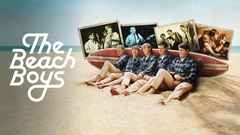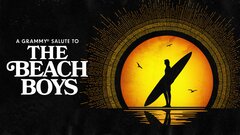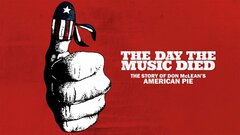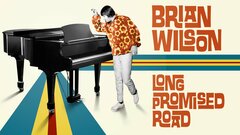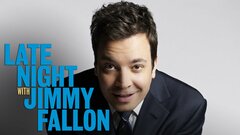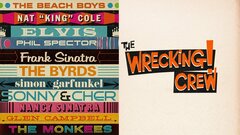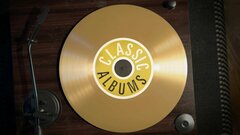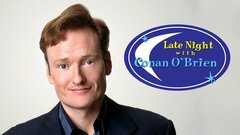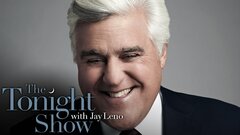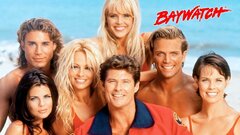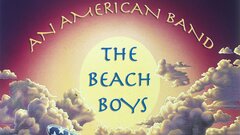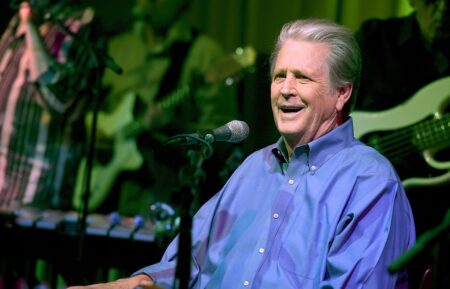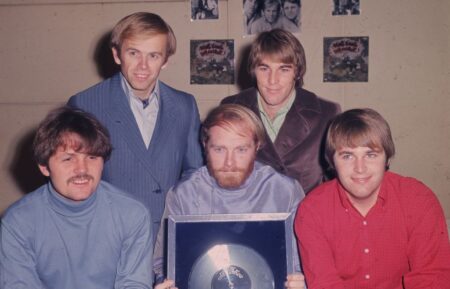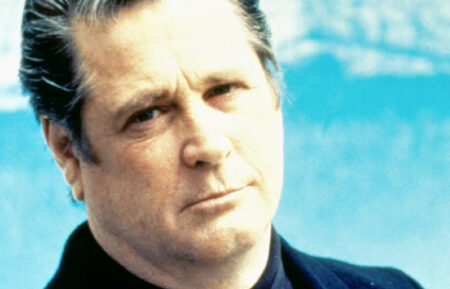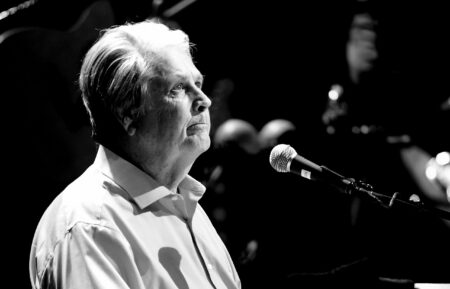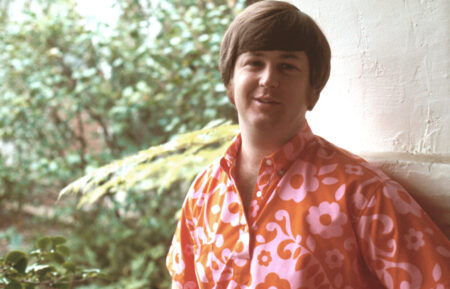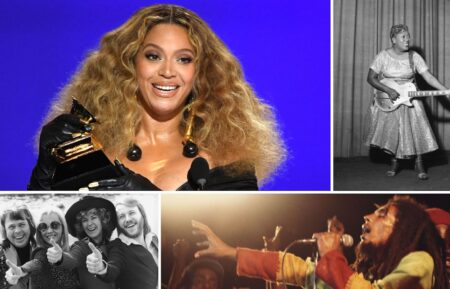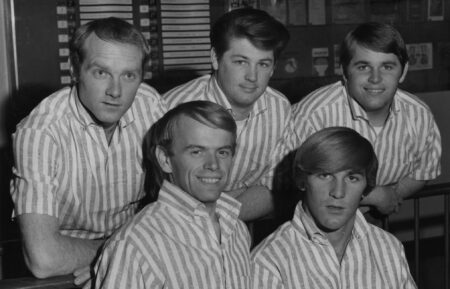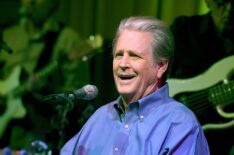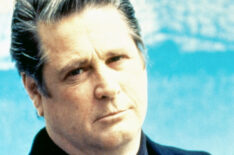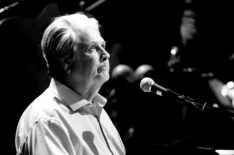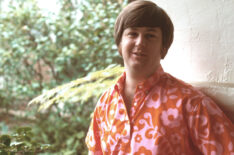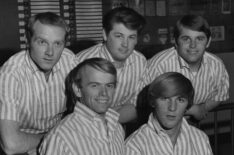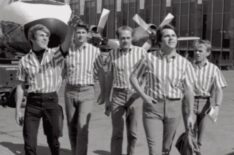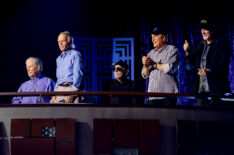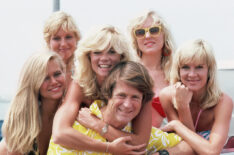Arguably the most significant American pop composer of the 20th century, Brian Wilson was a founding member of the Beach Boys and a major influence on the sound and scope of popular music for over five decades. With brothers Dennis and Carl, cousin Mike Love and schoolmate Al Jardine, Wilson created a signature sound that linked folk and jazz vocal harmonies to rock's heavy beat, which instantly minted them as pop stars. His songwriting talents matured in the mid-1960s, moving from danceable pop ditties like "Surfin' Safari and "I Get Around" to mini-symphonies marked by lyrical beauty and intricate arrangements.
The culmination of this period was the complex, emotionally stirring Pet Sounds, a high-water mark in the development of pop music as an art form. But the achievement came at a price; drugs and internal pressures within the group destroyed his proposed masterwork, SMiLE (1968), sending Wilson into a psychological tailspin for the next three decades. He resurfaced in 1995 with his demons in check, and began an astonishing string of musical accomplishments, including the completion of SMiLE in 2004.
Eight years later, he stunned observers by reuniting with the surviving Beach Boys for That's Why God Made the Radio (2012), which returned them to the Top 5 for the first time in nearly four decades. Throughout his life, Brian Wilson clung to the idea that music was a direct link to love and spirituality, a notion that preserved his status as one of popular music's most revered figures.
Born Brian Douglas Wilson in Inglewood, CA on June 20, 1942, he was the eldest of three sons by Murry Wilson, a machinist and aspiring songwriter, and his wife, Audree Korthof. His musical gifts allegedly became apparent as an infant, when he was able to repeat song melodies after only a few listens. By all accounts, the defining primal moment in Wilson's life came at the age of two, when he first heard George Gershwin's "Rhapsody in Blue," which provided him with a touchstone for the expansive song structures that would become the hallmark of his most creative work. The irony of Wilson's life was that he heard "Rhapsody," as well as all musical compositions, in monaural sound due to profound hearing loss in one ear. The cause of this condition was never given in a definitive sense, though many sources, including Wilson himself, said that it was the result of a blow to the head from his father. Though a talented athlete in school, music soon came to dominate Wilson's life He began singing at school and family functions, displaying a remarkable voice with a near-perfect falsetto. He soon became obsessed with vocal harmony, spending hours listening to and then deconstructing the pristine four-part vocal arrangements of the pop group the Four Freshmen. Wilson soon began performing at his high school, first with a classmate, and later with cousin Mike Love and brother Carl. Classmate Al Jardine and brother Dennis Wilson were soon added to the group, which recorded a demo of its first single, "Surfin," in 1961. The completed song, released on the Candix label in October of that year, became an immediate hit on Los Angeles radio, and led to a contract with Capitol Records. Wilson soon set to work on its follow-up, the exuberant "Surfin' Safari," which shot to No. 3 on the Billboard singles chart in 1963. A slew of Top 10 hits, co-written with Love or songwriter Gary Usher, soon followed, including "Catch a Wave," "Little Deuce Coupe," "Surfer Girl" and "409," each paeans to such teenage touchstones as cars, school, and the beach, and all were gilded by the group's gorgeous five-part harmonies. By 1964, the Beach Boys were not only one of the world's most popular rock-n-roll acts, but an enduring influence on pop music, not only on contemporaries like the Beatles, the Who and Jan and Dean, but on a generation of young's people who would draw on their sound for their own music, like Elton John, the Eagles, Jackson Browne, Chicago and many others. They, in turn, passed on Wilson's legacy to newer acts like XTC, Elliot Smith, Jon Brion and countless others.
Though still in his early twenties at the time of the Beach Boys' breakthrough, Wilson was already displaying a far-reaching musical vision. His talents as a songwriter and producer quickly exceeded the cars-and-girls scope of the band's early work, as evidenced by such breathlessly lovely ballads as "In My Room," "Don't Worry Baby" and "The Warmth of the Sun," which compared favorably to the streetwise poetry of Phil Spector's recordings. However, Wilson's creative energies were quickly worn down by the Beach Boys' relentless touring schedule, which precipitated an anxiety attack on a flight to a concert in Houston in 1964. The band quickly installed session guitarist and singer Glen Campbell and later songwriter Bruce Johnston as Wilson's replacement on the road, freeing up the bandleader to focus his attention solely on studio work. Almost immediately, the material was light years ahead of its predecessors; songs like "Please Let Me Wonder" and "She Knows Me too Well" in 1965 showed extraordinary lyrical maturity, while "California Girls," from the same year, was an epic slice of proto-psychedelia merged with the Beach Boys' sun-dappled aesthetic. The record was reportedly produced in the aftermath of Wilson's first experience with LSD, one of several drugs that would wreak untold havoc on his mental health in the years to come.
Upon hearing the Beatles' Rubber Soul that same year, Wilson commenced on what was later acknowledged as his masterpiece: Pet Sounds (1966). Wilson enlisted the talents of lyricist Tony Asher and the Wrecking Crew, the crack team of studio musicians who performed on countless pop and rock albums of the period, to bring his vision to life. The result was Wilson's most mature effort to date, a perfect merger of his growing studio talents and a lyrical scope on songs like "Wouldn't It Be Nice" "God Only Knows" and "Caroline, No" that bridged the adolescent yearning of the Beach Boys' early sides with a melancholia and hopefulness in regard to adulthood. Though hailed by critics, the record saw only modest sale, due in part to Capitol's reluctance to embrace the band's new sound; more significantly, it created a fissure within the Beach Boys, specifically between Wilson and Mike Love, over the creative direction of the band, which would set in motion the decades of discord that later plagued the band in the 1970s and beyond.
While putting the finishing touches on Pet Sounds, Wilson began amassing elements for an epic song that he hoped to feature on a subsequent album. Recorded in separate sections during arduous sessions at a variety of studios, the disparate parts were eventually assembled into "Good Vibrations," an astonishing artistic and technical achievement that surpassed even the far-flung scope of Pet Sounds. The completed song became the Beach Boys' third No. 1 single, and spurred Capitol Records to rally behind Wilson's next project, which he described as a "teenaged symphony to God." Enlisting the eclectic talents of singer-songwriter Van Dyke Parks to aid him in his musical quest, Wilson began recording an incredible array of vocal and musical tracks, all pointing towards a vast sonic portrait of America's history. But a host of problems soon developed that threw the project, initially titled Dumb Angel but later redubbed SMiLE (1968), into disarray. Wilson's prodigious appetite for psychedelic drugs had taken a toll on his mental state, as had self-imposed pressure to produce a record that could surpass the Beatles' own master work, Sgt. Pepper's Lonely Hearts Club Band (1967). More damaging to the work, however, was dissent from Love and other members of the group, who railed against Parks' poetic but cryptic lyrics, prompting him to leave the project before its completion. Left adrift with hours of unassembled tapes and growing animosity from his band, Wilson abandoned SMiLE, which began the long, tragic second act of his life and career.
With the cancellation of SMiLE, Wilson relinquished his control on the creative direction of the Beach Boys. Though he initially continued to serve as songwriter and producer for the group, his increasingly fragile mental state made it increasingly difficult for him to continue to serve the group in any useful manner. Brother Carl Wilson took over as the Beach Boys' de facto producer and lead vocalist, while Mike Love oversaw its concert presence which, per his wishes, focused more on the group's past hits than on Wilson's experimental efforts. Wilson himself withdrew to his own home, where he developed a debilitating cocaine habit. He emerged sporadically during the 1970s to contribute new material, especially when the Beach Boys' financial fortune was in trouble due to declining sales. His most significant work during this period was 1971's "'Til I Die," a melancholy ballad that reflected his own mental state in its references to mortality and existential futility, and the more upbeat radio hit "Sail On Sailor," which reunited Wilson with Van Dyke Parks in 1973.
Though Wilson appeared only occasionally at Beach Boys concerts, where his bloated figure and ragged vocals shocked longtime fans, he continued to draw income from the band's tours, which placed undue strain on their already faltering income. In an attempt to bring Wilson back to his senses - and, it was assumed, to prominence as a hit songwriter and concert draw - Wilson's wife, singer Diane Rovell of the '60s girl group the Honeys, and the band enlisted controversial therapist Eugene Landy to oversee his recovery. Fourteen months of intensive rehabilitation resulted in a brief period in which Wilson was stable enough to resume work with the Beach Boys. However, the results fell on deaf ears, as pop audiences had largely dismissed the band as a nostalgia act and Wilson as yet another casualty of the 1960s. For much of the 1970s, Wilson vacillated between recovery and relapse before descending into drug and food addictions that left him largely incapacitated. Though Landy had charged exorbitant fees for his services with Wilson, the Beach Boys organization had no choice but to bring the therapist back into the fold.
But while Landy was instrumental in helping Wilson regain his functionality, the therapist also wielded undue influence over the singer's existence. Having removed him from the Beach Boys in 1982, Landy made himself Wilson's creative partner, sharing songwriting and producing credits on the singer's self-titled solo debut in 1988. Though the record showed a glimmer of Wilson's prodigious talent, most notably in the wistful single "Love and Mercy," it was overwhelmed by the Beach Boys' own comeback single, "Kokomo," which reached the top of the charts in 1989. Around the same time, his daughters Carnie and Wendy Wilson were hitting it big alongside their friend Chynna Phillips with their musical act Wilson Phillips, Wilson appeared to lash out at his former bandmates with a 1990 autobiography, Wouldn't It Be Nice, but much of the book appeared to have been penned by Landy himself in an attempt to maintain total control over his patient. The therapist's interference also torpedoed Wilson's second solo record, Sweet Insanity (1991), which parent company Sire Records rejected due to its uncomfortably confessional lyrics and an ill-considered rap number. Eventually, Wilson's family took Landy to court to wrest away his control of the musician's life. A two-year legal battle ensued, during which it was revealed that Landy had kept Wilson on massive and unnecessary amounts of psychotropic drugs and had never allowed him to read the manuscript of his own autobiography. Landy was removed from Wilson's life in 1994, and his license to practice psychotherapy in California was revoked.
With his finances now overseen by a court-appointed conservator, and his mental state regulated by a mild regimen of antidepressants, Brian Wilson began a slow but consistent return to not only a normal life, but also a prominent musical career. After marrying former car saleswoman Melinda Ledbetter in 1995, he recorded new versions of classic Beach Boys tunes for the soundtrack to producer Don Was' documentary I Just Wasn't Made for These Times (1995) the same year he reunited with Van Dyke Parks on Orange Crate Art, a charming, intricate collection of pop vocal songs that featured Wilson providing all four parts in harmonic sections. In 1997, he reunited briefly with the Beach Boys for Stars and Stripes Vol. 1, which teamed the group with a number of modern country stars for new versions of songs from the Beach Boys' catalog. His second official solo record, Imagination, was released to positive reviews in 1999, but the most significant development of the period was Wilson's return to live performance. For decades, he had suffered from crippling stage fright, but with the aid of vocal coaches and a teleprompter, Wilson summoned the courage to front a 20-piece band anchored by Beach Boys guitarist Jeffrey Foskett and members of the Los Angeles pop group the Wondermints, which executed near-perfect versions of some of Wilson's greatest songs. A celebrated tour produced the live record Live at the Roxy Theatre (2000) before Wilson tackled his greatest achievement with Pet Sounds Live (2002). A third solo album of new material, Getting' In Over My Head (2004), featured collaborations with many of his famous admirers, including Paul McCartney, Elton John and Eric Clapton, but its most moving moment was unquestionably a final recorded effort with brother Carl, who died from cancer in 1988, on an unreleased track called "Soul Searchin'." Having defied the odds by returning to recording and performing, Wilson commenced on what was unquestionably the greatest challenge of his career: returning to the SMiLE tapes to assemble the completed record as he had conceived it in 1968. After reuniting with Parks, Wilson and Wondermints leader Darian Sahanaja painstakingly combed through countless hours of four-decade-old recorded elements, stitching together vocal fragments and unfinished musical interludes to achieve the impossible: finishing what was widely regarded as rock-no-roll's most legendary lost album. Wilson presented the completed SMiLE in concert at the Royal Festival Hall in London, which spurred a 10-minute standing ovation by an enraptured crowd. Wilson then recorded a new version of the album featuring his touring band, which reached No. 13 on the Billboard albums chart and generated his only Grammy award for the track "Mrs. O'Leary's Cow" in 2005.
A world tour to promote the album that same year was briefly halted by a suit filed by Mike Love over Wilson's alleged misappropriation of the Beach Boys' image to promote the new SMiLE. The suit was eventually dismissed in court as meritless. Though well into his sixth decade, by 2007, Wilson had resumed his tireless pursuit of new music with a series of critically acclaimed new solo albums. That Lucky Old Sun, released that same year, reteamed Wilson with Van Dyke Parks on a new cycle of songs that celebrated life in Southern California, while Brian Wilson Reimagines Gershwin (2009) was the result of a commission by George Gershwin's estate to create new material from unfinished piano pieces written by the legendary composer. The record shot to the top of the jazz charts in 2010, and brought Wilson's musical heritage full circle by paying tribute to the songwriter whose work had inspired him as a child. It was soon followed by In the Key of Disney (2011), a collection of songs from classic Walt Disney feature films.
The year 2011 also marked the 50th anniversary of the Beach Boys' formation, which set in motion months of speculation as to a reunion between Wilson and the surviving members of the group. Conflicting reports finally gave way to the news that Wilson, Mike Love, Al Jardine, Bruce Johnston and David Marks, who had served as the Beach Boys' first guitarist before departing the group in the early 1960s, would reunite for a tour and album. To the surprise of many, Wilson and Love appeared to settle their decades of animosity and produce not only a very successful national tour but a new album, That's Why God Made the Radio (2012), which debuted at No. 3 on the Billboard albums chart - their highest placement since the 1974 compilation album Endless Summer. In doing so, the album also expanded the Beach Boys' span of Top 10 records to 49 years, the second longest in music history after Frank Sinatra and slightly ahead of the Beatles. Though Wilson often appeared uncomfortable on stage or in interviews with his bandmates, he delighted fans by expressing enthusiasm at the prospect of recording and touring with the Beach Boys in the future.
By Paul Gaita

